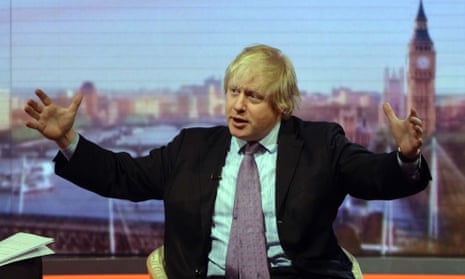Politics, runs the cliche, is the art of the possible. The compromise. The curbed expectation.
Not any more. Not in the age of Brexit and Trump. In 2017, politics is the art of the impossible. Of writing blank cheques and scattering them to the wind. Of peddling fantasies and promising the voters they will be made flesh by tomorrow.
In this era, Billy Liar wouldn’t be daydreaming in a funeral parlour –he’d be sat round the cabinet table, mentally measuring up the curtains in No 10. The British lion will roar, promises foreign secretary Boris Johnson while Liam Fox, the cabinet minister formerly known as disgraced, hisses at the BBC for being too pessimistic.
The British government is stacked full of fantasists and the EU brings out the worst in them. As if in homage to Alice’s White Queen, our ministers expect us to believe six impossible things before Brexit.
That £350m a week will pour into our NHS (Johnson) – until it doesn’t. That the UK will negotiate a trade pact with Angela Merkel in Berlin (David Davis) – until it turns out to be Michel Barnier in Brussels. But never mind, the deal with Brussels will be “one of the easiest in human history” (Liam Fox) – until it isn’t. That, even with no deal looking more and more likely, the government needs draw up no concrete plans, nor set aside any contingency funds (Philip Hammond). That nothing will change for Hungarian or Polish nationals in the UK (Daniel Hannan) – until they are used as human bargaining chips. That Britain can sign 40 trade deals the morning after leaving the European Union (Liam Fox)– all 40 of which Britain already has through the EU.
Part of the politician’s job is to gauge what the audience wants to hear – and such magical thinking goes down a treat with a good section of the public. To quote from one survey from the last few days, over three quarters of Welsh voters would not be willing to lose any money at all for the UK to leave the EU. Yes, the same Wales that voted for Brexit and in which a Cardiff University study shows that every man, woman and child receives a net £79 every year from Brussels – until March 2019 at least. Another poll shows nearly three quarters of the public believes no deal is better than a bad deal. The same no deal that could see flights grounded and mile upon mile of lorries queueing at Dover, beeping and billowing fumes.
Call those politicians shysters, by all means, and those polled misinformed – but that ignores the changed political climate. It ignores how the purveyors of these pipe dreams are cheered to the rafters, not just by the party faithful but by the rightwing press, too, before being taken seriously on the nightly news bulletins.
The impossible is now lauded, while reflection or arithmetic or plain old common sense is denounced as treasonous. In the land of cognitive dissonance, the truly delusional politician is king – or at the very least treated to coffee and croissants by Marr and Peston.
But this era of impossible politics did not appear all of a sudden last June. The referendum only marked the point at which the dam finally broke. One big clue to how we got here emerged last week, from an unlikely source.
A few days ago, the officials paid by the British public to make sure the chancellor’s maths add up admitted they had got their sums badly wrong. The Office for Budget Responsibility (OBR) said it had persistently overestimated the size of the British economy. You may know some of the details, because they were splashed all over the front pages and TV bulletins. But the chief focus of those stories was Hammond: would he stay at No 11, or would Michael Gove move in?
This is another example of what I have called before cutesification – the shrinking of any debacle, no matter how big, to ensure it fits within the confines of a short studio discussion.
Yet the debacle is huge. The OBR is a pillar of economic policymaking. What it says on the government’s forecasts goes. And what it confessed last week was that it has been excessively optimistic about how much Britain’s workforce can produce. Not just once, but ever since it was set up in 2010. Nor was this just a small boo-boo: productivity helps determine everything from how much you’ll get paid to how much tax the government will get. And Britain’s productivity record this decade has been a disaster.
This week, the owners of the Vauxhall car plant in Ellesmere talked about its possible closure – citing poor productivity compared with the rest of Europe. In Germany, a worker can clock off on a Thursday afternoon having done as much as it will take a British counterpart until Friday evening to do.
Ever since its establishment, the OBR has assumed that Britain will get back on track in two years’ time. In 2010, the bounceback was due in 2012. By 2012, that was going to be in 2014 – and so on.
Despite criticism, despite reality, it has lurched on like a thirsty man in a desert, forever assuring his comrades of the oasis just ahead. Now it has had to admit reality – and that will mean our forecast growth rates now halving and the public finances heading for what officials term a “bloodbath”. In other words, if Hammond sticks to his austerity plan, you can expect the cuts to our disability benefits, schools and hospitals to drag on for even longer.
The OBR assumed that post-crash Britain would return to normal and that normal meant Britain’s bubble economy in the mid-2000s. This belief has been rife across our economic establishment. As Danny Blanchflower, formerly a rate-setter on the monetary policy committee, points out, the Bank of England has consistently assumed that wages in Britain are about to start rocketing up by 4% a year – as if by magic! In reality they’ve inched up slower than the rate of inflation, which is why the average worker is poorer now than they were at the start of the decade.
Over the past decade, the British public has been assured that the banks are rock-solid, that austerity will end soon and that there will be jam tomorrow. None of these things has come true. When the experts fail and expertise is broken, then any joker with a good yarn to spin is legit. The good folk of the Treasury, the OBR and the Bank of England would doubtless be horrified at any comparison with such clowns as Johnson and Fox. Their thinking is backed up by models, their pronouncements come in official publications. But they are guilty of a similar un-realism and they have proven just as impervious to criticism. This age of impossibilism is partly their creation.

